|
|
|
Sort Order |
|
|
|
Items / Page
|
|
|
|
|
|
|
| Srl | Item |
| 1 |
ID:
169546
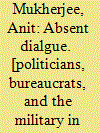

|
|
|
|
|
| Publication |
New Delhi, Oxford University Press, 2020.
|
| Description |
xvii, 313p.hbk
|
| Series |
Modern South Asia
|
| Standard Number |
9780197507193
|
|
|
|
|
|
|
|
|
|
|
|
Copies: C:1/I:0,R:0,Q:0
Circulation
| Accession# | Call# | Current Location | Status | Policy | Location |
| 059773 | 322.50954/MUK 059773 | Main | On Shelf | General | |
|
|
|
|
| 2 |
ID:
092895
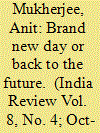

|
|
|
| 3 |
ID:
114136
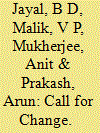

|
|
|
|
|
| Publication |
New Delhi, Institute for Defence Studies and Analyses, 2012.
|
| Description |
78p.Pbk
|
| Series |
IDSA Monograph Series No. 6 July 2012
|
| Standard Number |
9789382169055
|
|
|
|
|
|
|
|
|
|
|
|
Copies: C:2/I:0,R:0,Q:0
Circulation
| Accession# | Call# | Current Location | Status | Policy | Location |
| 056728 | 355.60954/JAY 056728 | Main | On Shelf | General | |
| 056729 | 355.60954/JAY 056729 | Main | On Shelf | General | |
|
|
|
|
| 4 |
ID:
114913
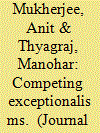

|
|
|
|
|
| Publication |
2012.
|
| Summary/Abstract |
This article analyses US-India strategic relations and the potential role of defence trade. First, it argues that cooperative relations between the two countries are hindered by "competing exceptionalisms" and the lack of a pre-existing model for the relationship. At the same time, bilateral relations are being strengthened by a convergence of interests and increasing societal linkages. Even on issues that have historically divided New Delhi and Washington-such as relations with third countries-there is a more nuanced understanding of differing perspectives in both capitals. Second, the article analyses the role of defence trade in the bilateral relationship. While describing recent trends, it also examines existing problems and peculiarities. The authors make two recommendations and argue that US-India relations, despite their differences, have fundamentally transformed and are set irrevocably on an upward trajectory.
|
|
|
|
|
|
|
|
|
|
|
|
|
|
|
|
| 5 |
ID:
160626
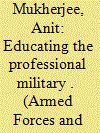

|
|
|
|
|
| Summary/Abstract |
This article analyzes the ways in which civil–military relations shape professional military education (PME). Its main argument is that military education benefits from a civil–military partnership. In doing so, the article examines the role of civil–military relations in shaping PME in India. While describing the evolution of military education in India, it analyzes its weaknesses and argues that this is primarily due to its model of civil–military relations, with a limited role for civilians. Theoretically, this argument challenges Samuel Huntington’s notion of “objective control”—which envisaged a strict separation between the civil and military domains. Conceptually, this article argues for a greater dialogue on military education among civilians, both policy makers and academics, and military officers and not to leave it to the military’s domain—as is currently the practice in most countries.
|
|
|
|
|
|
|
|
|
|
|
|
|
|
|
|
| 6 |
ID:
183896
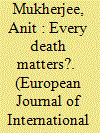

|
|
|
|
|
| Summary/Abstract |
How do combat missions, defined as an armed confrontation that causes casualties, shape civil-military relations and military’s role conception? This article argues that militaries that incur combat casualties gain a stronger hand in the civil-military equilibrium. This is because casualties affect domestic political opinion and give prominence to the views expressed by military officials. Civilians are then more deferential to professional military advice. In turn, the military obtains considerable operational freedom, and can pick and choose missions which they find desirable. Second, the military’s role conception – an important determinant of military missions, is shaped most prominently by its combat experience. Militaries sustaining casualties obtain leverage vis-à-vis civilians and based on their institutional preference, they either prioritise or avoid non-traditional missions. While making these arguments, this article examines combat casualties, role conception, and civilian control in India. These concepts as a whole and, the Indian case study especially are surprisingly understudied considering it is among the few non-Western democracies with firm civilian control, a record of overseas intervention operations and a military with varying roles and missions. Analysing India’s experience therefore adds to the literature and illuminates the mechanism through which casualties affect civil-military relations.
|
|
|
|
|
|
|
|
|
|
|
|
|
|
|
|
| 7 |
ID:
109826
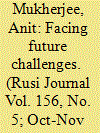

|
|
|
| 8 |
ID:
103810


|
|
|
|
|
| Publication |
New Delhi, IDSA, 2011.
|
| Description |
63p.
|
| Series |
IDSA occasional paper no. 18
|
| Standard Number |
9798186019886
|
|
|
|
|
|
|
|
|
|
|
|
Copies: C:2/I:0,R:0,Q:0
Circulation
| Accession# | Call# | Current Location | Status | Policy | Location |
| 055882 | 355.0330954/MUK 055882 | Main | On Shelf | General | |
| 055883 | 355.0330954/MUK 055883 | Main | On Shelf | General | |
|
|
|
|
| 9 |
ID:
151423
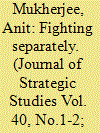

|
|
|
|
|
| Summary/Abstract |
How do countries transition from single service to joint operations? This article engages with the discussion on military innovation to argue that civil–military relations are the most important driver for jointness. In doing so it examines jointness in the Indian military. Relying on archival research and primary interviews this article sheds new light on the operations of the Indian Peacekeeping Forces (IPKF) in Sri Lanka from 1987–1990, the 1999 Kargil War and the Post-Kargil defence reforms. The main argument is that the Indian military’s transition to jointness has been ‘incomplete’ primarily because of its prevailing model of civil-military relations. This model prevents civilians from interfering in the operational issues of the military, including on matters pertaining to jointness. It therefore recommends more forceful civilian intervention to overcome the prevailing single service approach.
|
|
|
|
|
|
|
|
|
|
|
|
|
|
|
|
| 10 |
ID:
164695
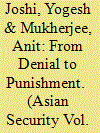

|
|
|
|
|
| Summary/Abstract |
This article argues that China’s rise and its growing military power have intensified the Sino-Indian security dilemma. For a long time after the 1962 war, India’s military posture along the India–China border was mostly defensive in nature and could be characterized as imposing “deterrence by denial.” However, over the last decade, China’s growth trajectory coupled with rapid modernization of its military called into question the efficacy of this approach. India now feels much more vulnerable to China’s increasing military power both on the land frontier as well as in the maritime domain. The increasing intensity of this security dilemma has informed a consequent shift in India’s military strategy vis-à-vis China to one of “deterrence by punishment.” Theoretically, this article examines how changes in the severity of a security dilemma can lead to changes in military strategy. While doing so it explains India’s current military strategy to deal with the challenge posed by China.
|
|
|
|
|
|
|
|
|
|
|
|
|
|
|
|
| 11 |
ID:
188248
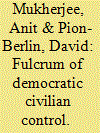

|
|
|
|
|
| Summary/Abstract |
In this introduction we present the justification and the analytical frame of our special issue. More specifically, this issue examines the institutional role of defence ministries in fortifying civilian control and military effectiveness. As we argue, scholarship on this subject is sparse, despite the ministry’s importance in enforcing civilian control, enhancing military effectiveness, and conducting the day-to-day affairs of national defense. If defence ministries are to fulfill these obligations, they must be properly positioned, financially and bureaucratically endowed, as well as staffed with knowledgeable civilians with sufficient authority. Not all ministries are up to these standards. To highlight these aspects, our special issue examines the defense ministries of four countries, two of which are older democracies (France and India) and two more recently established ones (Argentina and South Korea). These case studies pay particular attention to organizational design of the ministries, the roles assigned to civilian and military personnel, how much defense expertise civilians and officers can claim, and whether there are mechanisms that allow ministry personnel to convert resources into military strength. We underscore our contribution to the literature and suggest avenues for further research.
|
|
|
|
|
|
|
|
|
|
|
|
|
|
|
|
| 12 |
ID:
164693
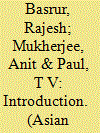

|
|
|
|
|
| Summary/Abstract |
This introduction explains the rationale for this special issue of Asian Security. It begins with a short discussion about the relevance and the utility of the term “security dilemma” in international relations. The concept, which emerged during the Cold War, has since been used extensively to describe India-China relations. This special issue attempts to add to our understanding of the India–China relationship as well as to contribute to enriching the theoretical literature in a number of ways. First, it represents the first detailed effort to present a set of analyses that encompasses theory, history, and the full spectrum of strategic issue areas to explain the dynamics of a key contemporary inter-state relationship involving China and India. Second, the analysis reveals the complexity of security dilemma politics by highlighting how states respond to their predicament in different ways. Third, this special issue draws attention to an area that has been largely neglected in the literature: the relationship between the security dilemma as a concept and domestic politics. Finally, a case can be made that a security dilemma-type response in a situation that does not demand it may actually create a dilemma where none existed before. These and other complexities are abundant in this collection of articles. The chapter concludes by summarizing the main arguments presented by the contributors to this special issue.
|
|
|
|
|
|
|
|
|
|
|
|
|
|
|
|
| 13 |
ID:
188250
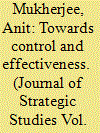

|
|
|
|
|
| Summary/Abstract |
This article analyses India’s Ministry of Defence and its influence on civil-military relations. It argues that, until very recently, the strategic intent of the defence ministry has primarily focused on civilian control over the military. The resultant institutional structure of civilian control compromised the effectiveness of the Indian military. This was due to several features of the country’s model of civilian control, including a lack of civilian expertise, bureaucratic procedures underlying civil-military interactions as well as military autonomy. Acknowledging these problems, the government has currently embarked on reforms to maximize military power. It is doing so mainly by infusing military expertise at the ministerial level. However, this may upend the civil-military dynamic in India and the success of this initiative remains to be seen. Conceptually, this article examines a possibly pernicious effect of a civilian dominated ministry and highlights the importance of expertise in enhancing both control and military effectiveness.
|
|
|
|
|
|
|
|
|
|
|
|
|
|
|
|
| 14 |
ID:
189443
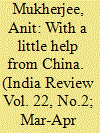

|
|
|
|
|
| Summary/Abstract |
This article examines the reasons underlying the re-emergence of the Quad in 2017 and the areas of convergence and divergence between U.S. and Indian views of it especially during the Trump administration. While doing so, it makes the following arguments. First, the current iteration of the Quad emerged because of changing threat perception regarding China among all four Quad countries. Second, President Trump’s hard line, bordering on adversarial, position vis-à-vis China was positively received by other members of the Quad and encouraged them to shed their inhibitions. In addition, Trump’s delegative style of leadership on the Quad allowed senior and mid-level officials to creatively engage with the other powers. Third, all this notwithstanding, there were still significant divergences, stemming from strategic and diplomatic worldviews, between the perspectives of the Quad countries on the future direction and purpose of the grouping. Put another way, the Quad will always be a work in progress because of the divergences between its member states and its inherently flexible design. The article concludes by analysing the prospects for the Quad.
|
|
|
|
|
|
|
|
|
|
|
|
|
|
|
|
|
|
|
|
|